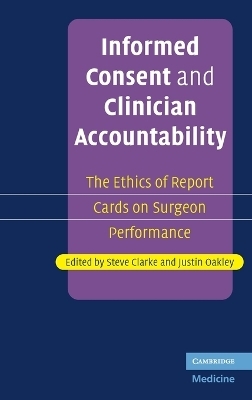
Informed Consent and Clinician Accountability
Cambridge University Press (Verlag)
978-0-521-86507-4 (ISBN)
This timely book analyses and evaluates ethical and social implications of recent developments in reporting surgeon performance. It contains chapters by leading international specialists in philosophy, bioethics, epidemiology, medical administration, surgery, and law, demonstrating the diversity and complexity of debates about this topic, raising considerations of patient autonomy, accountability, justice, and the quality and safety of medical services. Performance information on individual cardiac surgeons has been publicly available in parts of the US for over a decade. Survival rates for individual cardiac surgeons in the UK have recently been released to the public. This trend is being driven by various factors, including concerns about accountability, patients' rights, quality and safety of medical care, and the need to avoid scandals in medical care. This trend is likely to extend to other countries, to other clinicians, and to professions beyond health care, making this text an essential addition to the literature available.
Dr Steve Clarke is a Senior Research Fellow at the Centre for Applied Philosophy and Public Ethics, Charles Stuart University, Australia, and a Research Fellow with the Programme on the Ethics of the New Biosciences, James Martin 21st Century School, University of Oxford. Dr Justin Oakley is Director of the Centre for Human Bioethics at Monash University, Victoria, Australia.
Acknowledgements; Introduction: accountability, informed consent and clinician performance information Justin Oakley and Steve Clarke; Part I. Accountability: Introduction; 1. Clinician report cards and the limits of evidence-based patient choice Michael Parker; 2. Report cards for institutions, not individuals Neil Levy; 3. Safety, accountability, and 'choice' after the Bristol inquiry Tom Sorell; 4. Public reports: putting patients in the picture requires a new relationship between doctors and patients Merrilyn Walton; 5. Adverse event disclosure: benefits and drawbacks for patients and clinicians Paul Barach and Michael Cantor; 6. Report cards and performance monitoring Stephen Bolsin and Liadain Freestone; Part II. Informed Consent: Introduction; 7. Informed consent and surgeons' performance Steve Clarke and Justin Oakley; 8. The value and practical limits of informed consent Merle Spriggs; 9. Against the informed consent argument for surgeon report cards David Neil; 10. Trust and the limits of knowledge David Macintosh; 11. Surgeons' report cards, heuristics, biases and informed consent Steve Clarke; 12. Report cards, informed consent and market forces A. J. Walsh; Part III. Reporting Performance Information: Introduction; 13. Is the reporting of an individual surgeon's clinical performance doing more harm than good for patient care? Silvana F. Marasco and Joseph E. Ibrahim; 14. Examining the link between publicly reporting health care quality and quality improvement Rachel M. Werner and David A. Asch; 15. Hospital and clinician performance data: what it can and cannot tell us Paul Aylin; 16. An ethical analysis of the defensive surgery objection to individual surgeon report cards Justin Oakley; 17. Surgeon report cards and the concept of defensive medicine Yujin Nagasawa; 18. Training, innovation and surgeons' report cards Tony Eyers; 19. Doctors' report cards: a legal perspective Ian Freckelton.
| Zusatzinfo | 1 Tables, unspecified; 2 Line drawings, unspecified |
|---|---|
| Verlagsort | Cambridge |
| Sprache | englisch |
| Maße | 160 x 235 mm |
| Gewicht | 638 g |
| Themenwelt | Medizin / Pharmazie ► Gesundheitswesen |
| Medizin / Pharmazie ► Medizinische Fachgebiete ► Chirurgie | |
| Medizin / Pharmazie ► Medizinische Fachgebiete ► Medizinethik | |
| Studium ► Querschnittsbereiche ► Geschichte / Ethik der Medizin | |
| ISBN-10 | 0-521-86507-7 / 0521865077 |
| ISBN-13 | 978-0-521-86507-4 / 9780521865074 |
| Zustand | Neuware |
| Haben Sie eine Frage zum Produkt? |
aus dem Bereich


